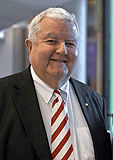|
News & Views item - November 2011 |
![]() Physics Today Has A Chat With Australia's Chief Scientist.
(November 19, 2011)
Physics Today Has A Chat With Australia's Chief Scientist.
(November 19, 2011)
The November 17 issue of physicstoday.org carried an article under the banner A chat with Australia's chief scientist with the subhead "Besides its recent Nobel successes, Australia excels in another scientific endeavor: making science policy".
Some excerpts:
 Last
week I visited the Australian Embassy in Washington, DC, to have a chat with Ian
Chubb, Australia's chief scientist. He was in town to promote Australian science
and to meet science policy makers. He'd just arrived from London; his next stop
was Ottawa. Chubb is a neuroscientist, whose research focuses on the
biochemistry of signal transmission. Before he took up his position, he served
as the vice chancellor—that is, the chief executive officer—of the Australian
National University in Canberra.
Last
week I visited the Australian Embassy in Washington, DC, to have a chat with Ian
Chubb, Australia's chief scientist. He was in town to promote Australian science
and to meet science policy makers. He'd just arrived from London; his next stop
was Ottawa. Chubb is a neuroscientist, whose research focuses on the
biochemistry of signal transmission. Before he took up his position, he served
as the vice chancellor—that is, the chief executive officer—of the Australian
National University in Canberra.
In its population (22.7 million) and GDP ($1.2 trillion), Australia resembles a medium-sized European country. Its scientific output is that of a rich, advanced nation. According to Thomson-Reuters, Australia's share of the world's scientific papers published in 2006–10 was 3.17%, 10 times its share of the world's population.
Climate change is a hot political issue in Australia. The failed effort in 2010 to establish a cap-and-trade system for greenhouse emissions led to the resignation of Australia's previous prime minister, Kevin Rudd.
On climate change, Chubb said he regarded his role as providing the Australian government with the best scientific advice. As for whether a carbon tax is the best course of action and, if so, what its value should be, "That's a matter for economists."
On the topic of science education, Chubb cited a recent survey that revealed, surprisingly, that 70% of the undergraduate students taking chemistry at Australian universities are freshmen. Evidently, Australian undergraduates study chemistry more as a prerequisite for medicine and other subjects rather than as a subject itself. Chubb suspects the same could be true for physics.
Prompted by those and other concerns, Chubb is overseeing a new study of
Australia's science skills base and its relevance to the country's present and
future needs. Another study led by Chubb will assess Australia's publicly funded
research.
Besides seeking to improve the health of science at home, Chubb and his fellow policy makers want Australia to play a bigger international role.